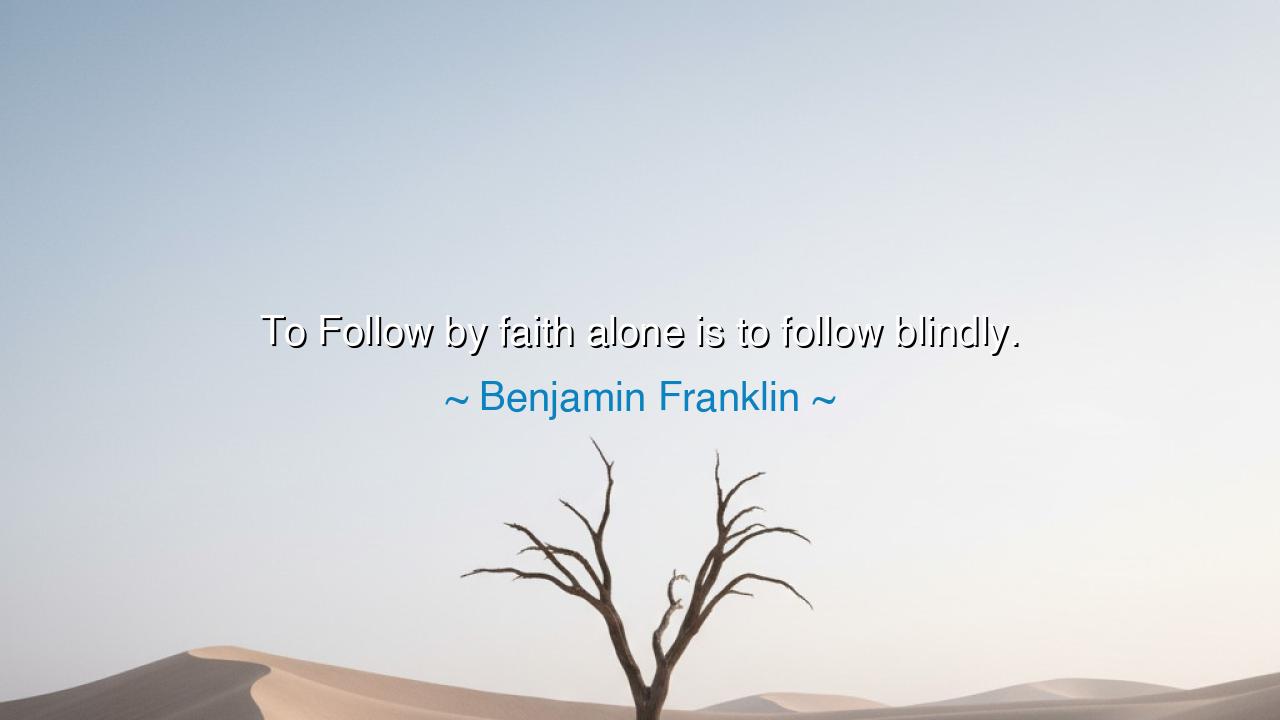
To Follow by faith alone is to follow blindly.






"To follow by faith alone is to follow blindly." These words by Benjamin Franklin speak to the profound importance of reason, understanding, and self-awareness in guiding our beliefs and actions. Faith—a powerful and often unwavering belief in something beyond our immediate comprehension—has long been revered as a pillar of human existence. However, Franklin cautions that blind faith, when not accompanied by reason, reflection, and questioning, can lead one down a path of misguided action. To follow without understanding or scrutiny is to relinquish personal agency and to become a tool of forces greater than oneself. Franklin, in his wisdom, advocates not for the abandonment of faith, but for its integration with critical thought and personal discernment.
In the ancient world, the tension between faith and reason was a constant theme in the teachings of the philosophers. Socrates, the father of Western philosophy, famously declared that “the unexamined life is not worth living.” Socrates believed that reason and questioning were essential for understanding the world and one’s place in it. He did not advocate blind adherence to the beliefs of his time but urged his followers to question, to probe, and to seek truth for themselves. This commitment to self-examination and reasoned inquiry set him apart from those who simply accepted traditions without understanding their deeper meaning.
Similarly, in Plato’s Republic, the idea of the philosopher-king emerges—a ruler who combines both wisdom and reason to govern justly. In Plato’s view, a ruler who acts solely on faith or personal belief, without the illumination of reason, risks leading others into darkness and tyranny. The philosopher-king’s task is not to blindly follow the traditions of society, but to illuminate the path with knowledge and understanding. This idea deeply resonates with Franklin’s warning that faith alone, without the guiding light of reason, can lead us astray.
One might look at the Age of Enlightenment in history—a period that championed reason, science, and individual liberty—as a direct response to the blind faith that had dominated much of human history. Think of the scientific revolution, where figures like Isaac Newton and Galileo Galilei challenged the prevailing dogmas of their time with the light of reason and empirical observation. Galileo, in particular, was persecuted by the Church for supporting the heliocentric theory, which contradicted traditional teachings. His work represents the courage to seek truth through observation and reason, even when it meant questioning long-held beliefs. Blind faith in authority or tradition, without the application of reason, led many to resist this revolutionary thinking—much as Franklin warned.
In the context of political movements, history provides numerous examples of blind faith leading to disastrous consequences. Consider the rise of totalitarian regimes in the 20th century. In Nazi Germany, the propaganda machine led millions to follow the orders of Adolf Hitler, not out of reason or understanding, but through blind loyalty and faith in the leader. The disastrous results of this blind following are evident in the suffering and devastation caused by the Holocaust. Here, blind faith became a tool of manipulation, and the lack of critical thinking led to the betrayal of human decency. Franklin’s warning about following faith alone resonates deeply in such contexts: to blindly follow without scrutiny or understanding is to lose one’s freedom and integrity.
The lesson in Franklin’s words is not an attack on faith itself, but a call to action for balance. Faith, when combined with reason, can lead to a life of purpose, wisdom, and compassion. True faith should not be blind, but should be illuminated by the light of understanding. Reason empowers us to question, to reflect, and to align our beliefs with truth, ensuring that our actions are not just driven by unexamined tradition but by a deep, personal understanding of the world and our place within it.
In our own lives, let us strive to live by reason and faith in harmony. When faced with decisions—be they personal, professional, or political—we should ask ourselves: “Do I understand the why behind this belief or action?” We should not follow the crowd, nor should we blindly accept ideas because they are popular or tradition-bound. Instead, we must seek clarity, use our reasoning mind, and engage with others in constructive dialogue. In this way, we honor the wisdom of both faith and reason, ensuring that our beliefs are not only heartfelt but grounded in truth and understanding.






AAdministratorAdministrator
Welcome, honored guests. Please leave a comment, we will respond soon